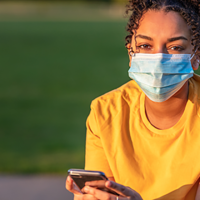Online self-help
-

Shore: a safe place for young people worried about sexual behaviour
Children and young people engaging in harmful sexual behaviour is a national public health issue, affecting thousands of young people across the UK every year. Despite this, there are few services available to support young people once harm has taken place and even fewer for young people concerned about their own or someone else’s sexual thoughts, feelings or behaviour.
- Event type
- Talk with Q&A
- Location
- LIVE STREAM
-

Technology Matters: Online, self-help single session interventions could expand current provision, improving early access to help for young people with depression symptoms, including minority groups
Open Access paper from the CAMH journal – ‘Current mental health service provision for young people was primarily designed based on an assumption of repeat attendance to enable access to interventions. This applies to in-person therapy and, in recent years, digitally provided apps and programmes. Yet, discontinuation after only one or two attendances or uses is a common problem. However, there is a different model, which is intentionally designing provision without assuming repeat attendance, that is, single session interventions.’ Maria E. Loades (pic) and Jessica L. Schleider
Read more -

CAMHS services in our physically distanced world
On March 23rd 2020, the way healthcare was provided in England had to change overnight. With the COVID-19 pandemic sweeping across the country, CAMHS staff had to adapt to the news that they must provide routine services from home where possible and all non-urgent face-to-face contact must cease to prevent the spread of the virus.
Read more -

Online self-harm content might provide peer support to young people
Youth today find themselves living in an era of social media, with easy access to a wide range of social networking sites. Unfortunately, emerging evidence suggests that some social technologies might cause more harm than good to some young people’s mental health.1,2
Read more -

Self-harm in a time of isolation: What is the evidence to support mobile and internet-based psychological interventions for self-harm?
In this blog we summarise the findings and implications of a recent systematic review of studies evaluating the effectiveness and acceptability of mobile- and internet-based psychological interventions for self-harm in adolescents and adults.
Read more -

mHealth ineffective for depression prevention
A universal cognitive behavioural therapy (CBT)-based mobile messaging programme (MEMO CBT) designed to prevent teenage onset depression provides no clinical benefit, according to results of a double-blind, randomised, placebo-controlled trial.
Read more